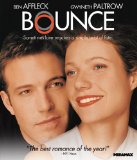| Reviews & Columns |
|
Reviews DVD TV on DVD Blu-ray 4K UHD International DVDs In Theaters Reviews by Studio Video Games Features Collector Series DVDs Easter Egg Database Interviews DVD Talk Radio Feature Articles Columns Anime Talk DVD Savant Horror DVDs The M.O.D. Squad Art House HD Talk Silent DVD
|
DVD Talk Forum |
|
|
| Resources |
|
DVD Price Search Customer Service #'s RCE Info Links |
|
Columns
|
|
|
Bounce
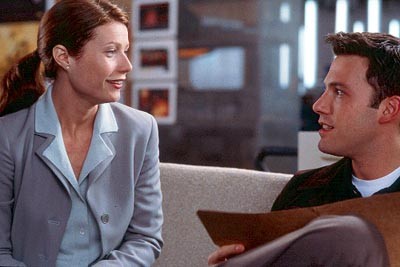
Please Note: The images used here are promotional stills from the film's release and are not taken from Blu-ray edition under review.
As a follow-up to his irreverent, sneakily heartwarming 1998 directorial debut, The Opposite of Sex, writer-director Don Roos's 2000 picture Bounce is a significant letdown. It boasts at least twice the star power as the earlier film -- Ben Affleck and Gwyneth Paltrow, still basking in the Miramax-Oscar glow of, respectively, Good Will Hunting and Shakespeare in Love-- but that seems to work against it; this is a remarkably safe film from an auteur who had proven himself before (and would again, with 2005's Happy Endings) capable of something much scrappier, more engaging, and more relevant than another bland, nominally "indie" romantic drama that purports to take on the always-germane, important matters of love, death, and morality, but instead ends up smoothing all that out into something soothing and impotent.
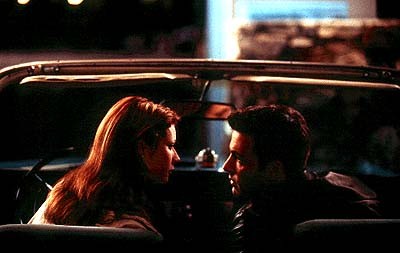
The most obvious problem is Affleck's character, Buddy, a hotshot L.A. advertising exec who likes probably more than his share of the ladies and the booze. This glib jerk, just ripe for redemption, is supposed to face a moral dilemma when, in the interest of following through on a one-night stand with a woman (Natasha Henstridge) he's been flirting with during a flight delay, he gives his upgrade ticket back to L.A. to Greg (Tony Goldwyn), a screenwriter who's eager to return to his family. The flight crashes, killing everyone on board, and Buddy is stuck with the knowledge that it could've/should've been him in that ill-fated seat in which Greg met his untimely end. To compound matters, the dubious ethicality of the business Buddy is in is driven home when his firm takes on the airline's self-serving, damage-control PR account in the wake of the disaster, with Buddy's partners overruling his objections. When his nascent alcoholism, inflamed by these turns of events, starts to become a liability, he's shipped off to Palm Springs for rehab, and it is in the penance-doing, AA-attending aftermath of that coming to terms that he decides to seek out and make amends to the widow of the man in whose death his reckless, self-indulgent ways played some unintentional part.
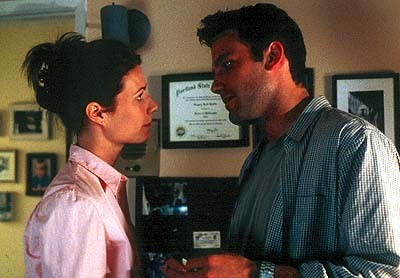
Said widow (and mother of two now fatherless boys) is Abbie (Paltrow), whom Buddy tracks down as she begins her new job as a commercial realtor. Diverted from his path of honest apology by the instant spark between them, he poses instead as a potential client, and the two strike up a business relationship and a tentative romance, the flames of which are fanned by Buddy's new, also-in-recovery, gay-and-sassy (what else?) assistant, Seth (Johnny Galecki, Roseanne). But Abbie and Buddy aren't being entirely honest with one another (he about the part he played in her life before they ever met, she regarding her real vulnerability after her husband's death), and as they fall deeper in love, what's withheld waits to inevitably surface and jeopardize the chance these hurt and damaged people have to form a family and help each other make a new start.
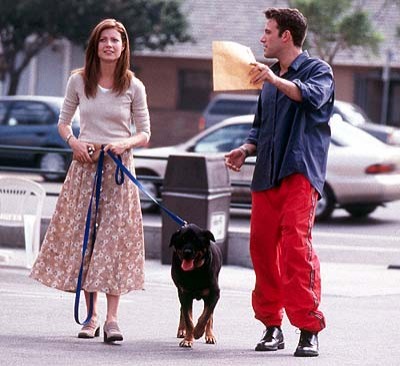
Buddy is tepidly conceived and written to begin with, so neither his flaws nor his good points ever feel very substantial or convincing; as played by the reliably lukewarm Affleck, his harrowing alcoholism and plaguing moral incertitude comes across as not much more than being really, really tired, and his big-lug, aw-shucks routine as he becomes a good guy/potential husband and father are no more or less than what you'd expect from the actor. As for Paltrow, she's given quite a bit more to do and does much better with it; I prefer her as the slightly sullen, wounded, complex Abbie (and, of course, as Margot Tenenbaum) than as all her delicate, fresh-faced maidens combined. One only wishes the movie had been Abbie's story -- her marriage, her dashed contentment, her loss, her grief, her struggle to raise two children alone -- than this lite despite its best intentions drama-romance of two unhappy people (but not too despondent or overwhelmed; nobody wants the story of a widowing, ongoing guilt, and a potentially disastrous affair to bring them down!) brought together by a dubious combo of misfortunate and serendipity. By the time we get to the big emotional climax, which actually goes somewhere and displays some of the courage of its convictions, even giving Affleck some pain he can access and act, it's too little, too late: it only serves to point up how relatively feeble and vague the rest of the film is, with its Hollywoodized version of how "regular," flawed people think, feel, work, behave, live, and love. (The gay-assistant/matchmaker character is the worst; after the rich, generous, complicated, humanizing-all-around view of relationships gay and straight in The Opposite of Sex, that particular sop to tiresome TV/movie conventional wisdom is the rancid cherry atop Bounce's disappointingly stale cake.)
Roos has the great Robert Elswit (Magnolia, Good Night, and Good Luck, etc.) as his cinematographer, and the unique SoCal light thereby becomes the real star of the film. But Elswit's well-lit images belong to another, much better and more serious movie; it really can't singlehandedly overcome the insistence of Roos, editor David Codron, and (one strongly suspects) the notorious Harvey Weinstein a.k.a. Harvey Scissorhands on shooting and cutting the film in a dull, desultory, seemingly prescribed manner that sanitizes everything; this includes the use of the most pseudo-wounded/inspirational adult contemporary pop music on the soundtrack, accompanied by a score by the often wonderful Mychael Danna (The Sweet Hereafter, The Ice Storm), who was apparently asked to tug at our heartstrings and make our spirits soar with the wallpaper-like, interchangeable musical underpinning he provides.
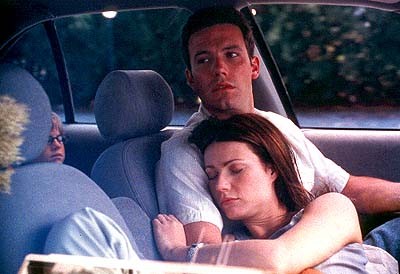
Bounce is a strange kind of mess; it's a jumbled-up, erratic, somnambulistic film just because it is so intent on watering down the jumbled-up, erratic, messy, life-like feelings and experiences it depicts; it wants the emotion and pain and depth of Serious Drama, but it consistently shies away from its Bergmanesque impulses (which still manage to shine through on rare occasion, as in one isolated close-up/profile shot, nicely written by Roos, powerfully delivered by Paltrow, and restrainedly lit/shot by Elswit) and robs us of any the raw, uncomfortable, effective intimacy that might have made it work. It's a unique frustration one feels when watching a film like Bounce (and there are more than enough others) -- one that might possibly have had some force but instead seems to make the conscious choice to become just another inconsequential, cookie-cutter, Miramaxized drama with no life or mind of its own.
THE BLU-RAY DISC:
The AVC/MPEG-4, 1080/24p transfer looks good, with no real visual flaws other than, perhaps, a slight overuse of digital noise reduction making the image flatter than it should be, lacking some of its celluloid texture. The slight annoyance of the barely-incorrect aspect ratio of 1.78:1 instead of the theatrical ratio of 1.85:1, however, is a wound that has salt rubbed into it by the fact that the scenes from the film singled out for special commentary by the cast and director in the special features are in the correct aspect ratio, demonstrating the obvious if small difference between how it should have looked and how it looks as cropped down for the feature presentation -- an unwise decision on the part of the disc's distributor, pointing up its own slight but in this context difficult to overlook negligence when it came to truly, conscientiously presenting the film as intended.
Sound:The film's sound design is quite good (what you often hear, as mentioned above in comments on the music selections and score, is another matter entirely), and the disc's DTS-HD Master Audio 5.1 soundtrack delivers it boldly, clearly, and multidimensionally, with no audio flaws whatsoever.
Extras:--A feature-length commentary with the self-deprecating Roos and co-producer Bobby Cohen along to jog his memory. Roos is a winning, self-deprecating, utterly unpretentious personality, so the commentary is pleasant and enlightening to listen to; it does, in fact, reveal that the film as it came to be in the final cut was a victim of indecisiveness, waffling, and interference (not spelled out but implied) meant to neuter it into palatability. One assumes the commentary was recorded not long after the film had played and was being prepared for release to DVD; it's worth noting here that, in an interview with Film Comment for the release of his much, much better 2005 film Happy Endings, Roos virtually disowned Bounce as a Frankenstein monster concocted from bits of his own, tougher yet more genuinely thoughtful and sensitive vision and the insipid, big-Oscar-drama /Miramax-sensibility that he was convinced and coerced into as the shoot and postproduction went along.
--Forty-five minutes of deleted scenes with optional commentary by Roos and Cohen. Here we can see the indecisiveness and tearing between sensibilities that neutered the film; many of these scenes would have been preferable to what is left in the film, making it funnier at times, at others giving it much more emotional heft. The commentary reveals the unfortunate (you can hear the regret in Roos's voice) decision-making process toward something that wasn't too "hard" -- yes, the film is soft, and these scenes and commentary are instructive in revealing how a film that didn't necessarily have to be as soggy and limp as it is can be reduced through a softening-up process in the editing room.
--Just in case you missed the halfhearted, fake-"alternative" soft rock exemplified by Leigh Nash's "Need To Be Next to You" and hearing it in the film wasn't enough, the disc also features its Bounce-clip-incorporating music video.
--"All About Bounce," a disposable 22-minute featurette/commercial evidently designed to be aired in half-hour slots on cable TV. Clips of the film are interspersed with interviews in which the actors explain their characters and Roos explains his story. There are also truly yucky, sycophantically star-polishing "About Gwyneth" and "About Ben" segments, complete with smarmy narrator reminding us of their careers and how truly exceptional their talents are. A waste of disc space.
--The latter supplement is almost made up for by "Ben and Gwyneth Go Behind the Scenes" (mostly Gwyneth), in which Affleck interviews writer/director Roos and Paltrow visits with everyone from D.P. Robert Elswit to the boom operators and hairstylist. This is actually really good stuff (not to be cruel, but it's more relevant and interesting than the movie that came out of the inner workings we're given a glimpse into here), letting us into the day-in, day-out routines of life on a set and the broad spectrum of duties that have to be distributed in the creative and filmmaking processes.
--A 4-1/2 minute gag reel which reveals some of the irreverent spontaneity that the film itself could have used more of; Affleck, Paltrow, Roos, and company are certainly having more fun making the film than we are watching it.
--Forty-five minutes of selected scenes commentary with Don Roos, Ben Affleck, and Gwyneth Paltrow, sometimes amusing and sometimes obnoxious (Affleck, as captured here, is an oaf) in which an underlying ambivalence on everyone's part about how their project turned out is actually fairly clear behind their ostensibly good-natured taunting of one another (the way Affleck and Paltrow tease each other makes one wonder if this commentary was recorded back when they were still a couple).
--A selection of trailers for other Miramax titles now being released to Blu-ray by Lions Gate.
FINAL THOUGHTS:Don Roos, as he demonstrated in The Opposite of Sex and Happy Endings, is wonderful with life's emotional gray areas, a master of unsentimental feeling, and an expert chronicler of life's sometimes awful, sometimes wondrous unpredictability and odd happenstance. None of that comes through in the dulled-down, bland Bounce, however; and what makes it more frustrating is that there are moments, good ones, where you can see what the movie could have been with more confidence from the director in his own unique sensibility and vision, even faced with the extra weight of Big Stars like Ben Affleck and Gwyneth Paltrow (and even with a Big Little Studio like Harvey Weinstein's Miramax) to provide predesignated Oscar bait for. Affleck is predictably bland, Paltrow is good when she's allowed, but the places the film goes and the way it's executed for the most part feel so rote and uninspired that not much in it leaves you with anything other than a vague, shrugging sense of dissatisfaction followed immediately by a blank spot where one's impression of the film would have been, had it had more of an impression to make. The only thing Bounce evokes in the end is just how by-the-numbers a certain boutique-studio type of "indie" film had become by the turn of the millennium after what felt like so much fresh blood, so many unleashed and unsullied visions over the course of preceding decade's indie-film successes, both commercially and artistically. If it's a taste of that freshness, energy, and intelligence you seek, it's Roos's other films you'll want to look into; Roos himself has subsequently endorsed the view that this one is for the curious and the completists only. Rent It.
|
| Popular Reviews |
| Sponsored Links |
|
|
| Sponsored Links |
|
|
| Release List | Reviews | Shop | Newsletter | Forum | DVD Giveaways | Blu-Ray | Advertise |
|
Copyright 2024 DVDTalk.com All Rights Reserved. Legal Info, Privacy Policy, Terms of Use,
Manage Preferences,
Your Privacy Choices | |||||||









